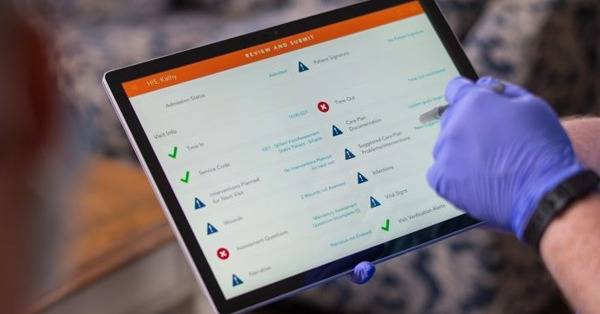- Solutions
- Solutions
- Home Health
- Hospice
- Life Plan Community
- Palliative Care
- Private Duty
- Senior Living
- Skilled Nursing
- Skilled Nursing
- Skilled Nursing Software
- Advanced Insights
- Customer relationship management
- Data and analytics
- Financial & operations management
- Marketing
- Nutrition management
- Referral management
- Regulatory compliance
- Retail management
- Resident engagement
- Revenue cycle management
- Skilled nursing interoperability
- Partners
- Blogs
- Resources
- About
- User Conference

Using AI tools to enhance staff training and support
The challenges around staff onboarding, training and retention that post-acute care providers have been wrestling with for several years are not likely to diminish soon. As the numbers of seniors needing care increase and the caregivers available to care for them remain stagnant, the best viable solution currently available to help resolve ongoing staff shortages is technology to improve efficiency.
As AI tools become more common in post-acute settings, there are several ways caregivers are finding they can help elevate care. If EHR vendors take the right approach to integrating AI into their platforms, I believe these tools can help caregivers focus less on the platform itself—as in “Does this belong in a nursing note, progress note or observation?”—feel more confident in their actions, and focus more on providing the care each resident needs.
I see three main ways AI tools will help clinicians and other staff deliver better care: Support and documentation, ease of use, and alerts and reminders. We’ll explore how AI can make a difference in each of these categories.
Improved automation and support for documentation
Healthcare is complex, and as a result, it requires complex systems and processes to support it. That complexity extends to EHRs. Right now, this means that if a user has a question about how to perform a specific task or solve a problem with the EHR, it requires manually searching through extensive documentation to find an answer.
But emerging AI tools such as large language models (LLMs) can quickly sift through large amounts of system documentation. These tools can read, understand and provide answers for users based on instruction manuals, system specifications and other guides. This means that instead of a user needing to look up information about a specific feature or issue with the EHR, they can simply ask the AI tool, which will function as a support analyst. The tool will provide an answer, based on all the existing manuals, for how to use the system. It will feel as if they have someone who is very familiar with the system right beside them. This is an area where MatrixCare is actively investing so we can provide support at their fingertips.
Ease of use
The more difficult a system is to use, the more time-consuming and complex the onboarding process for new team members will be. We’ve been focusing on a user-experience oriented approach to software design, similar to the way Apple always keeps the user in mind when they design systems and products. Just as their systems feel smooth and seamless, we’re applying those same ideas to our applications and platforms. This means we’re putting ourselves in the user’s shoes to determine the easiest and most straightforward ways for them to complete their tasks.
The other approach to improving ease of use relies on technology and automation, particularly the LLMs I mentioned previously. The LLMs have reduced barriers and allow the system to function more as an assistant than a software platform because the LLM allows the system to understand the logic of the workflow and make connections. For instance, if a user fills out a form that indicates a patient has diabetes, the system then brings the user to the right forms or pages to record information about blood sugar levels. These logical progressions have been made easier due to these intelligent, large models that can contextually understand logical processes. We’re applying this technology to workflows that are typically complex and difficult to navigate within the EHR, with the goal of reducing the difficulty of learning and using the platform.
Alerts and reminders
EHR systems today are large and complex. No matter how much training a user has had or how often they use certain modules or features, sometimes there are parts of these systems they aren’t exposed to on a day-to-day basis. In these cases, they might need some help navigating the system. That’s why we’re putting a combination of alerts and notifications right in the workflows. To use forms as an example again, if a caregiver is filling in vital sign data and one reading is out of range, the system will alert the caregiver so they can verify if that data is actually correct or was measured incorrectly. The alert serves as a “double take” so the caregiver can focus on the patient and make sure everything they’re putting into the system is accurate.
There’s another more complex way we’re seeing AI used in EHR systems. AI tools can analyze thousands of data points across the EHR to help caregivers identify specific patients who might face specific risks, such as falls. This added visibility is built into the system and doesn’t create more work for the caregiving staff. They simply see an alert or a flagged reminder for a patient, and the nurse can choose to dig deeper if needed or put it in the background if it’s information they’re already aware of.
Driving better outcomes
Using AI tools to enhance ease of use and help staff members get the information they need to use the EHR is one more way to help ensure high quality care. If team members can perform their caregiving duties without feeling stress over how to use the EHR itself, they’ll have more time to focus on residents. MatrixCare will continue our work to incorporate AI tools into our solutions to help simplify workflows and improve resident outcomes.
Request a demo today for a closer look at MatrixCare.
Daniel Zhu
Daniel Zhu comes from a diverse background of clinical experience and technology entrepreneurship. Having spent five years in clinical and clinical research roles with the Alberta health system and the University of Toronto health network, he has diverted his medical expertise to architecting and building technology solutions to optimize health care practice. At various organizations, he has lead engineering teams, product teams, and founded his own natural language processing start-up in the clinical research space. Stepping away from the start-up world, Daniel has spent time as a data consultant for large corporations such as Ford, Co-op, and RBI. Re-entering the health technology field, today Daniel has recently joined the ResMed and MatrixCare team to lead the productization of AI and machine learning capabilities.
Related Posts


See MatrixCare in action
Start by having a call with one of our experts to see our platform in action.
MatrixCare offers industry-leading software solutions. Thousands of facility-based and home-based care organizations trust us to help them improve efficiency and provide exceptional care.






